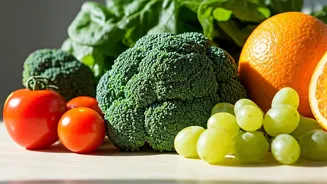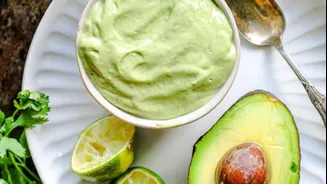Introduction: Colon Cancer Prevention
Colon cancer prevention has always been a key focus for medical professionals. Recent advancements in understanding the disease and its risk factors have
paved the way for effective preventive measures. One of the most significant factors that can be influenced is diet. The AIIMS-trained gastroenterologist emphasized the importance of a well-balanced diet rich in specific foods. The expert's recommendations provide practical guidance for people who want to minimize their chances of getting colon cancer. Incorporating these foods into daily meals can be a proactive step towards long-term health, as it aligns with the broader goal of maintaining a healthy lifestyle, contributing to the overall well-being and reducing the risk of a disease that affects a significant number of individuals across different demographics.
Section 1: Berries' Power
Berries, packed with antioxidants, are a fantastic addition to your diet for colon cancer prevention. The gastroenterologist highlights the significance of blueberries, strawberries, and raspberries, emphasizing their rich content of compounds that neutralize harmful free radicals in the body. Free radicals can cause damage to cells, potentially leading to cancer. Incorporating berries into your diet is a simple yet impactful strategy. You could add them to your morning cereal, blend them into smoothies, or enjoy them as a refreshing snack. This approach can help improve your health and reduce the chance of serious health concerns. Regular consumption of these fruits supports the body's natural defenses and supports overall well-being, highlighting berries as a key component of a cancer-preventive diet.
Section 2: Leafy Greens' Role
Leafy green vegetables are another significant group of foods recommended by the AIIMS gastroenterologist for colon cancer prevention. Spinach, kale, and other greens are rich in fiber, vitamins, and minerals that promote overall digestive health. Fiber aids in the regular elimination of waste, while vitamins and minerals help repair cells that have been damaged. Adding a variety of these vegetables to your daily meals is a great step to supporting the body's natural processes. You can incorporate them in salads, soups, or even in green smoothies. Regular consumption of leafy greens not only supports the body's natural defenses but also encourages a holistic approach to dietary choices, making them a crucial part of a diet designed to lower the risk of colon cancer.
Section 3: Cruciferous Vegetables
Cruciferous vegetables, such as broccoli, cauliflower, and Brussels sprouts, are recognized for their cancer-fighting properties. These vegetables contain compounds that can help detoxify the body and neutralize carcinogens, reducing the risk of cancer. The AIIMS gastroenterologist underscored the importance of regularly including these veggies in your diet. To gain the best benefits, try roasting, steaming, or lightly stir-frying them to maintain their nutritional value. Making cruciferous vegetables a core part of your meal plan ensures that you get the health benefits. This approach is an important step towards better health and reinforces the significance of making informed dietary choices to potentially minimize the risk of colon cancer and supporting overall well-being.
Section 4: Garlic's Contribution
Garlic, with its potent compounds, is recognized for its ability to fight various diseases, including cancer. The gastroenterologist emphasizes that garlic helps boost the immune system and can hinder cancer cell growth. The inclusion of garlic in daily meals is an easy and effective method. Incorporate garlic into your cooking by adding it to sauces, stir-fries, or marinades. Garlic can be enjoyed raw or cooked. The incorporation of garlic into your diet not only contributes to the reduction of cancer risk but also helps improve your general health and supports the idea that making simple dietary changes can produce significant health benefits and help prevent colon cancer.
Section 5: The Power of Nuts
Nuts are a convenient and nutritious food. The AIIMS-trained gastroenterologist suggests including them in your diet due to their high fiber and antioxidant content, which are beneficial for colon health. Nuts support the natural processes in your body and help prevent damage to cells that might otherwise lead to cancer. Enjoy a handful of almonds, walnuts, or other nuts as a snack, or add them to salads or cereals. This makes incorporating them into your routine easy. Including nuts in your daily diet promotes good health and offers protection. Nuts' health benefits provide a simple way to take preventative steps against colon cancer, supporting an overall healthy lifestyle.
Section 6: Beans and Legumes
Beans and legumes are highlighted for their high fiber and protein content, which are crucial for maintaining a healthy digestive system. The gastroenterologist recommends these foods for their role in promoting regular bowel movements and removing toxins from the body. These are considered to be an essential part of a cancer-prevention plan. Incorporating beans and legumes into your meals is easy. They can be added to soups, stews, or salads. Regular consumption improves your health and reinforces the importance of using nutrient-rich foods to help reduce the risks of colon cancer. This is one of the many steps one can take to improve health and wellness.
Section 7: Whole Grains
Whole grains are essential because they contain high amounts of fiber, which is important for promoting healthy digestion and reducing the risk of colon cancer. The gastroenterologist recommends replacing refined grains with whole grains to improve overall health. Examples include brown rice, oats, and whole-wheat bread. These can be easily incorporated into your diet by including them in your breakfast, lunch, or dinner. Eating whole grains is essential for maintaining health and supports the body's natural defense systems. Integrating whole grains into your regular meals is a proactive approach to protecting your health and minimizing the risk of colon cancer. This simple choice can greatly enhance your overall well-being.
Section 8: Tomatoes' Advantages
Tomatoes, with their rich lycopene content, are praised for their antioxidant properties. Lycopene helps reduce cell damage and prevent the growth of cancer cells. The AIIMS gastroenterologist promotes the regular consumption of tomatoes. They can be added to a variety of dishes, consumed raw in salads, or cooked in sauces. This makes it convenient to incorporate tomatoes into your daily meals. Eating tomatoes has a direct impact on your health, contributing to a lower risk of colon cancer. This strategy underscores the importance of choosing nutrient-rich foods to aid in the prevention of this disease. Making tomatoes a standard part of your meals helps maintain good health and provides a simple, yet effective, method for disease prevention.
Section 9: The Role of Yogurt
Yogurt, particularly the kind that contains probiotics, is beneficial for gut health, according to the AIIMS gastroenterologist. Probiotics are essential for preserving a balanced gut microbiome, which is vital for preventing inflammation and supporting overall digestive health. They are also considered helpful for overall health. To get the best benefits, make sure to include yogurt in your diet. Enjoy it as a snack, in smoothies, or as a part of your breakfast. Regular consumption of yogurt supports the digestive system and promotes healthy habits. Yogurt consumption provides a simple way to enhance health and promotes the consumption of foods that help in disease prevention. This is an important step towards supporting your body's natural defenses.
Section 10: Limiting Red Meat
The AIIMS gastroenterologist suggests limiting the consumption of red meat, because high intake has been linked to an increased risk of colon cancer. Red meat contains compounds that can lead to cancer. The expert advises moderate consumption. This means eating red meat in small portions, and only occasionally. Reducing the intake of red meat helps lower your risk of colon cancer and makes your diet healthier. Implementing this change is an important part of a well-rounded diet, and will benefit you. Taking these steps towards a better diet will help in supporting your overall health and prevent colon cancer.














